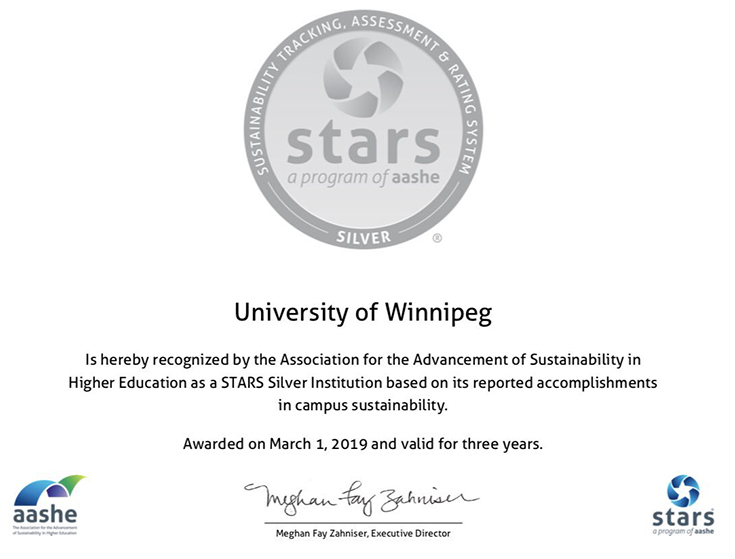 The University of Winnipeg has received its second silver STARS (Sustainability Tracking, Assessment, and Rating System) rating from the Association for the Advancement of Sustainability in Higher Education (AASHE).
The University of Winnipeg has received its second silver STARS (Sustainability Tracking, Assessment, and Rating System) rating from the Association for the Advancement of Sustainability in Higher Education (AASHE).
AASHE’s STARS scoring is based on the percentage of applicable points earned across its four categories: academics, engagement, operations, and planning and administration. Institutions are ranked at reporter (less than 25 points), bronze (minimum 25 points), silver (minimum 45 points), gold (minimum 65 points), and platinum (minimum 65 points) levels.
UWinnipeg joins 26 other Canadian institutions with a silver rating. There are 16 scoring gold and just one with the platinum rating.
“The fact that we’ve maintained silver suggests that the programs and initiatives we’ve put in place are working for the long term, and that they’re here to stay,” said Joseph Wasylycia-Leis, UWinnipeg’s Campus Sustainability Coordinator. “UWinnipeg did a lot of work on environmental performance management leading up to our 2015 application, so there was already that foundation to build on this time around.”
While UWinnipeg’s 2019 score of 59.78 is similar to the 2015 score of 58.33, Wasylycia-Leis said there were improvements made in a number of areas.
“We developed a new purchasing criteria forcing us to take ownership of the environmental impacts of everything we buy, we developed new building management guidelines that reflect that best practices established by LEED Operations and Management, and we’re taking a holistic and systematic approach to student engagement, primarily through the development of Eco Team UWinnipeg,” he explained.
There are still areas of improvement, which means a gold rating in the future is not out of reach for the University.
“The University of Winnipeg can definitely achieve a gold ranking — we just need to keep investing in sustainability on campus,” Wasylycia-Leis said. “This means developing innovative energy projects like the solar panel installation on Axworthy Health and RecPlex, and finding ways to enhance sustainability education for our students. We can also improve our sustainable purchasing practices and continue to foster partnerships with local businesses.”
Another notable accomplishment, he added, was the fact Diversity Food Services remains one of the most sustainable campus food providers in North America. Last September AASHE scored UWinnipeg as the top Canadian campus and fourth in the food and dining category thanks to Diversity’s six food outlets across campus.
While the accolades are nice, certification for certification sake doesn’t always lead to great sustainability.
“International rating systems don’t always capture the positive impact that our programs and initiatives are having,” Wasylycia-Leis said. “Just because we’re not meeting the specific criteria called for by STARS in some categories, does not mean our approaches in these areas are unsustainable.”




